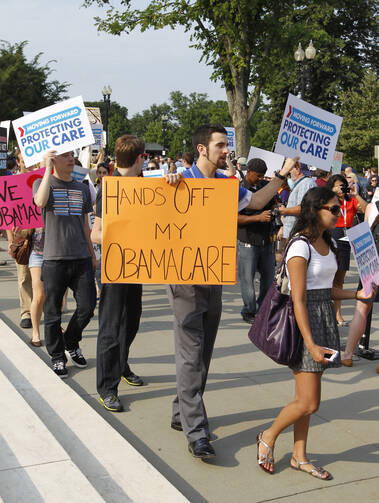The New Republic’s Alec MacGillis, in a post with the subtitle “Liberals Have a Problem with Bright Shiny Objects,” notes that Arizona’s “religious freedom” bill, vetoed last week by Gov. Jan Brewer, overshadowed the attempt by state legislators in Arkansas to block Medicaid expansion in that state. From MacGillis:
Liberals should by all means celebrate victories like the Republican Arizona Governor Jan Brewer’s vetoing of the discriminatory bill and the uproar in the Arizona business community that prompted the veto, which represent yet another marker in the hearteningly rapid advance of equal rights for gay Americans.But liberals who care about economic justice and fairness as well should ask themselves why there has been so much less uproar over legislative fights like the one in Little Rock that are going to have a very real and very immediate impact on tens of thousands of people — poor and working class people who thought they’d finally gotten health coverage only to have it yanked back a few months later.
Since MacGillis’s post, the debate in Arkansas has gotten some traction on left-leaning sites, but mostly because of a Republican state legislator who opposes the expansion despite receiving Medicaid benefits after a car accident that left him paralyzed. State Rep. Josh Miller was declared “Hypocritical Politician of the Year” (as well as something less polite) by the site Democratic Underground, which provided readers with a talking-points visual to post on Facebook. But it’s telling that the story has become another opportunity to mock Republicans as willfully ignorant; expanding Medicaid in Arkansas suddenly seems of a piece with the recognition of climate change. This framing is perfect for the upscale suburban voters outside the Bible Belt that Democrats must constantly flatter.
The point is not that Democrats must back away from marriage equality for gays and lesbians or move to the center on other social issues, including abortion, gun control and, possibly, marijuana legalization. That strategy may be advisable in scattered congressional and local races, depending on candidates’ personal beliefs as well as the views of constituents, but there’s little evidence they would be helped by such a cynical and transparent move at the national level. The question is whether the Democratic Party will make room for discussions about poverty and access to health care, education and other vital services.
Bill Clinton helped to shape the Democratic advantage in recent presidential elections by stressing deficit reduction, welfare reform, free trade and other policies that appeal to upper-income brackets. Hillary Clinton, presumed to be the 2016 nominee if she chooses to run, is certain to be more liberal than her husband on social issues, which include the championing of human rights for women and for gays and lesbians around the world. She’ll probably also follow the current trend away from “tough on crime” policies (at least there are no executions to her name). What’s unclear is how much she’ll talk about poverty, here and abroad, and what Pope Francis calls the “gap between the affluent and those who must be satisfied with the crumbs falling from the table.” In American politics, that is frighten-the-horses rhetoric.








